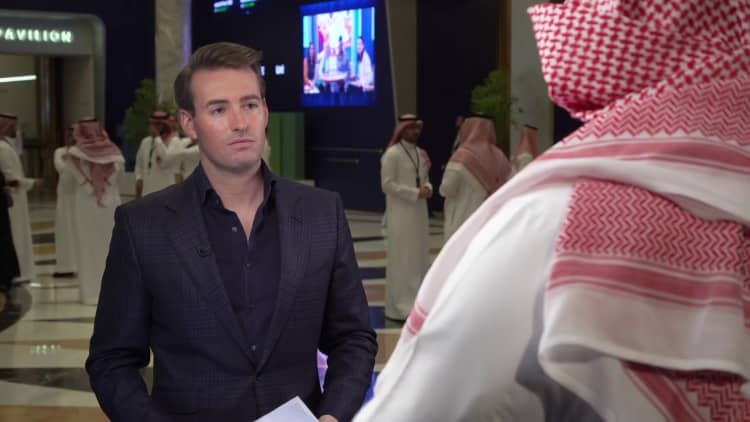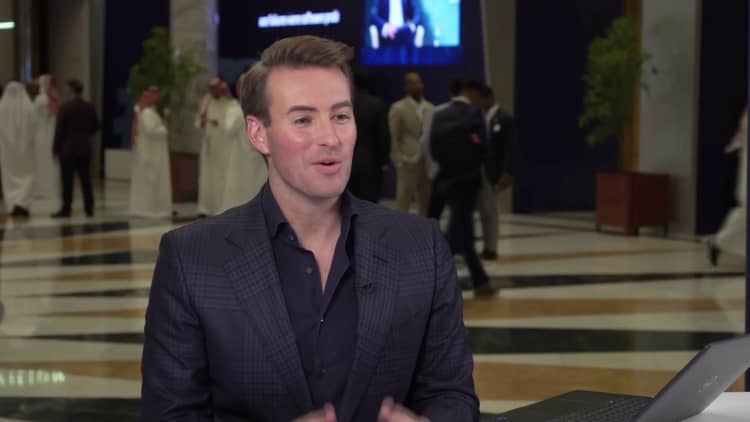The Saudi National Bank headquarters and other buildings in Riyadh.
Bloomberg | Bloomberg | Getty Images
RIYADH — Saudi Arabia is holding on to its ultimatum that foreign companies will need to base their regional headquarters in the kingdom or be barred from lucrative government contracts. The deadline: Jan. 1, 2024.
In a bold surprise move back in February 2021, the Saudi government announced that it would, by 2024, cease doing business with any international companies whose regional headquarters were not based within the country.
The news stunned investors and expat workers, many of whom saw the move as a shot at Dubai, the United Arab Emirates commercial capital that is home to the highest concentration of Middle East regional headquarters.
Faisal Al Ibrahim, Saudi minister of economy and planning, told CNBC that the plan is still going ahead and discussed how the kingdom aims to support foreign companies with the change.
When asked by CNBC’s Dan Murphy if the deadline is still in place, Al Ibrahim replied “Yes. And when you move, there are some benefits and some incentives that will make that make sense.”
The minister was speaking from Riyadh at the Future Investment Initiative, an annual three-day finance and investment conference hosted by Saudi Arabia’s Public Investment Fund and a brainchild of the Vision 2030 project.

“There’s a slew of incentives and benefits and support that’s always changing, always evolving, that are being discussed with these players as well,” Al Ibrahim said. “So it’s not just a negative reinforcement. There’s a lot of positive reinforcement as well.”
‘A lot of momentum’
Vision 2030, an ambitious campaign launched by Crown Prince Mohammed bin Salman in 2016, aims to create private sector jobs and diversify its economy away from oil as as Saudi Arabia’s population — more than 60% of whom are under the age of 30 — booms. The kingdom’s regional HQ drive is a part of that.
When first announced, the HQ ultimatum engendered skepticism and criticism on the part of many regional investors and analysts, who questioned the ability of Saudi Arabia — an infamously conservative Muslim theocracy known for its highly criticized human rights record — to sufficiently attract foreign talent. Expats in the regional HQ hub of Dubai questioned the kingdom’s ability to provide sufficient quality-of-life services like international schools, ample housing, and aspects of a more Western lifestyle, such as alcohol, which is currently illegal in Saudi Arabia.
But as more companies eye Saudi Arabia’s large and relatively untapped market, the kingdom is receiving plenty of interest and rapidly growing investment, Al Ibrahim said. The presence of several thousand foreign investors and financiers from all over the world at the week’s FII conference in Riyadh appeared to be a good gauge of that interest.
“We’re seeing a lot of momentum going through, we definitely prioritize the companies that are bringing the value creation to where the value is consumed, that create high quality jobs for people in Saudi Arabia, Saudis and others, and that actually help us achieve our quality outcomes from our needs, whether it’s services or goods at a better and more meaningful way,” the minister said, adding that the kingdom is receiving daily applications.
“[The companies’] responses are very meaningful and very positive,” he described. “For decades, our value has been leaking to other economies, which is fine. But today, the bet that the best for [35 million] and growing in terms of population is to bring the value creation to where the value is consumed,” he said.

“And in the long term, that’s better for these investors, these operations as they move, they can get closer to these markets. And they can leverage the young talent that’s available in Saudi, Saudi talent, and leverage the rest of the platform for them to even grow more competitively to other regions. We think ultimately, this is not just about Saudi Arabia, improving its position and procurement policy, but also it will have a strong trickle down effect on these companies and the economies around us.”
The World Bank forecasts an economic contraction of 0.9% for Saudi Arabia in 2023 on the back of lower oil production and prices. But the International Monetary Fund notes strong non-oil growth for the kingdom, which it says has accelerated since 2021, “averaging 4.8 percent in 2022,” and is expected to “remain close to 5 percent in 2023, spurred by strong domestic demand.”
Credit: Source link















